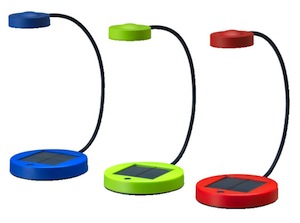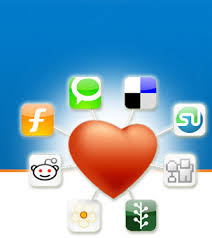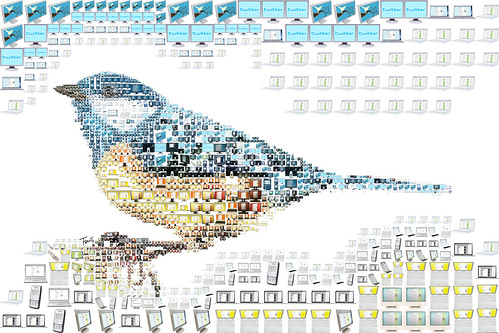 Last year I was walking through IKEA when I saw this strange little solar-powered goosenecked lamp in the lighting section. Intrigued, I bought it and took it home to try out. I love it. The bulb is nice and bright, perfect as a reading lamp. And the battery/solar panel unit pops out, so you can leave it by a window or on your car's dashboard, and it will fully charge while you're at work. Since then, I've gone back and bought a second one. I always have a battery pack charging on a windowsill, and I always have light for my latest book. Oh, and we brought one of the lamps on a camping trip. It was really handy there too. I left it on one night as a sort of night light for our daughter, and in the morning, it was still shining, just not as brightly. This is one of the few solar-powered gadgets I've encountered that actually works as promised. A nice additional bonus, for every lamp sold, IKEA donates one to a child in a country with unreliable electricity. -- Katherine Falk Ikea Sunnan Lamp $19 Available from and manufactured by Ikea |
Showing posts with label cloud. Show all posts
Showing posts with label cloud. Show all posts
Tuesday
Sunnan Lamp
Saturday
QUOTATIONS FROM THE FAST AND FRIENDLY CLOUDS!
Feel free to use some TANTALIZING QUOTES related to Twitter and Google for spicing-up your speeches, discussions, and board (bored?) meetings...
From Vogelstein writing in Wired magazine, August 2009:
Eric Schmidt, one of the founders of Google, repeatedly reminds his employees that Microsoft could crush Google at any moment. To wit:
Here's a couple from Jarvis in his What Would Google Do? book:
What Would Google Do?:
We're enjoying the multitudes of free web applications that are being developed nowadays to "just work," with the software vendor getting out of the way.

From Vogelstein writing in Wired magazine, August 2009:
“Google is big. Very big. Its millions of servers process about 1 petabyte of user-generated data every [60 minutes]...bigness is the very point of Google...its competitive advantage-is its ability to find meaning in massive sets of data. The larger the data sets, the more potential meaning can be derived...”By the by, one petabyte (PiB) is equal to 1,125,899,906,842,624 bytes (B), and each standard byte contains eight bits (ones and/or zeros). Impressive, isn’t it?

Eric Schmidt, one of the founders of Google, repeatedly reminds his employees that Microsoft could crush Google at any moment. To wit:
“...because Microsoft is a follower, there is a concern that it could use its Windows monopoly to restrict choices”
Here's a couple from Jarvis in his What Would Google Do? book:
Note that back then, the Twitter service was only 600 days old – this is a reflection of the significantly swift adoption rate that y'all have for web services that “just work” connect you with your friends and family.“When China’s Sichuan Province suffered its horrendous earthquake in May 2008, people who felt it firsthand shared their experience via Twitter...people in the quake zone would use Twitter to update friends...If I were going through a quake, I’d want to tell family and friends that I was safe, wouldn’t you?”
What Would Google Do?:
We're standing on the shoulders of Giants, right?

We're enjoying the multitudes of free web applications that are being developed nowadays to "just work," with the software vendor getting out of the way.
How do some of the newer, smaller, web vendors that "give away" free online services pay their employees, though?
The Web 2.0 conundrum...
Any brilliant ideas about this?
I keep hoping that this Golden (Google?) Age of developing free "just work" web applications lasts for a while.
If not, change will be brutally and significantly swift, too.
Talk about these ideas soon, eh?

Wednesday
TWORK...TWITTER TWEETS AT WORK
HOW I TWEET:

HOW I FIND NEWS:

HOW TO GET RELEVANT FOLLOWERS
LIVE AND SHARE IDEAS THAT WORK

- Answer the question "What is INTERESTING?" rather than "What are you doing?"
- Use your Follow Friends to filter the most relevant Tweets for your interests.
- Retweet so that anyone Following me can use me as a filter for interesting news.
Once your Twitter account has "hundreds" of Followers, it's interesting that more and more Followers start Following you non-stop after a certain point, eh?
HOW I FIND NEWS:
My Friends' Tweets have acted like a springboard to a wealth of informative sites.
Hashtags can be used like bookmarks when I Retweet these informative sites, and I can go back through and connect these to my own work;
if I'm lucky, by the time I go back to the hashtag, others have added similar Tweets under the same hashtag.

HOW TO GET RELEVANT FOLLOWERS
If you are promoting your business, you don't really want "anyone" to Follow your business' Twitter activity. You want relevant Followers that are actually interested in becoming a customer someday, right?
For marketing purposes, Tweets need to be sent in volleys of three to eight at a time, as close to each other as possible (you might consider using 3-8 multiple Tabs in your browser to achieve this).
One pattern that still seems to attract new Followers to you:
Tweet 1: interesting business news
Tweet 2: relevant information that is Trending at the moment
Tweet 3: your advertisement, promotion, or marketing
Tweet 4: interesting news
Tweet 5: relevant information that is Trending with a Hashtag at the moment
Tweet 6: your coupon (ala Dell)
Tweet 7: personal insight
Tweet 8: interesting business news
RESULTS: This model is used by people that perform SEO and SEM, and using it will give you at least the same number of interested Followers as the number of your Tweets...
IMPORTANT: Most of your Tweets ought to include links for full articles or for marketing links.
Marketing links need to go to "painless" actions...
think email subscriptions, automatic enrollments, satisfaction guarantees, and discounted payment pages with items already "in the cart."
LIVE AND SHARE IDEAS THAT WORK

Labels:
2.0,
advertising,
cloud,
marketing,
mobile,
news,
online,
promotion,
review,
SEM,
SEO,
technology,
tweet,
twitter,
url,
web,
work anywhere,
work from home
Tuesday
What Would Google Do? by Jeff Jarvis
Okay, this is one of my new heroes because he authored a brilliant book...

...more ideas at Buzzmachine.com

...more ideas at Buzzmachine.com
Teach, market, and work the "Google" way for the next several years with some contemporary concepts!
Warning: some of the innovative and down-to-earth ideas might make some people cringe, perhaps because they are such a true depiction of how people learn nowadays.
Warning: some of the innovative and down-to-earth ideas might make some people cringe, perhaps because they are such a true depiction of how people learn nowadays.
This book is an "easy read," and the first half contains very keen insights about how to improve profits (across industries) today through Google.
After reading about the future of sales, I considered how experiential marketing, brand awareness, and advertising is becoming a more essential part of the Google world. I mean, how would anyone know what to type in the search box without marketing?The latter chapters have some proposed models for the way the world might work in the future, and I noted how formal training, education, and continuing education is already changing into a more self-taught "Google" paradigm. Today, education is still a hot commodity - I think it can be kept "hot" with some of the following ideas, for starters:
Oh, while you're at it, have a look at the Popular Search terms box on the top left of my blog. Pretty nifty, eh?
- integrating WWGD? advice for both learners and instructors
(like requiring less rote memorization per se) - motivating institutions to establish creative marketing partnerships,
especially with respect to helping companies to develop their staff effectively;
Continuing Education, anyone? - flexing the requirements for instructors when it comes to
tenure, research, and field experience
BOOKMARKS - WORK ANYWHERE NOW!
1) ASSUMPTION
Major software applications that you need to get your work done are already, or soon will be, in the online cloud; all you will need is the right URL, username, and password to "get to work."

2) THE WAY WE WORK NOW
People are getting their work done in offices, at homes, and en route because laptop computers, fully-featured mobile phones with browsers, and public computer kiosks are ubiquitous.
3) A TINY TOOL BECOMES A HUGE LEVER
We can "work anywhere" with the right URL, username, and password.
Thus our URLs, usually kept as favourites or bookmarks in our favourite (favorite) internet browser, become the first stepping stone to reach our "work anywhere" office.

FREE SOLUTIONS...
Move your bookmarks and favorites out of your current browsers (i.e. home computer, work computer, and mobile phone) and import them into an all-in-one online bookmarking tool.
This will merge your collection of URLs, centralize access to them, and help you to truly "work from anywhere."

Major software applications that you need to get your work done are already, or soon will be, in the online cloud; all you will need is the right URL, username, and password to "get to work."

2) THE WAY WE WORK NOW
People are getting their work done in offices, at homes, and en route because laptop computers, fully-featured mobile phones with browsers, and public computer kiosks are ubiquitous.
3) A TINY TOOL BECOMES A HUGE LEVER
We can "work anywhere" with the right URL, username, and password.
Thus our URLs, usually kept as favourites or bookmarks in our favourite (favorite) internet browser, become the first stepping stone to reach our "work anywhere" office.

FREE SOLUTIONS...
DEL.ICIO.USTAKE HOME MESSAGE
Challenging to add new bookmarks with mobile phone browsers because the functionality of "Submit" buttons need to be simplified.
Well developed bookmarks that can be made public for social networking (i.e. how many other people using Delicious have bookmarked the same URL that I added).
Mobile phone browsers can log-in and use existing bookmarks.
Owned by Yahoo.
YAHOO BOOKMARKS
As of this writing, still very Beta with low search ability.
Good import ability.
DIIGO
Challenging to add new bookmarks with mobile phone browsers because the functionality of "Submit" buttons need to be simplified.
Challenging exportability because Tag details are lost.
Delayed updates to large quantities of bookmarks due to reindexing.
Well developed bookmarks that can be made public for social networking (i.e. what are other people using Diigo saying about the same URL that I added).
Mobile phone browsers can log-in and use existing bookmarks.
Previous views of websites are stored in cache, which is useful for defunct pages.
Based in Australia, and new owners of Furl.
GOOGLE BOOKMARKS (my choice)
Rushed development, but it works
(e.g. the Google Cart logo appears in older versions of Internet Explorer,
the Add and other functions appear at the bottom, after scrolling through your entire list of Labels).
Bookmarks are private, without social quantifiers nor caching.
Good search ability (of course).
Can add new links with mobile phone browsers because of simplified "Submit" button.
Good exportability.
Move your bookmarks and favorites out of your current browsers (i.e. home computer, work computer, and mobile phone) and import them into an all-in-one online bookmarking tool.
This will merge your collection of URLs, centralize access to them, and help you to truly "work from anywhere."

Monday
EVEN EGYPTIAN GODS HAVE KNOW-HOW FOR WEB 2.0?
Alan Moore wrote Watchmen, V for Vendetta, and thought-provoking short stories for DC comics. Have a look at him in the middle of a other cartoon characters in the Simpsons, below:

Quote from a fellow named MYSTICO in Moore's Terra Obscura:
"They were drowning in data, but almost bereft of knowledge....and of wisdom they knew nothing."
This definitely describes the plethora of web-based opportunities available in "the cloud" of information available nowadays.
The data that was previously stored in hard drives is now "in the cloud," which poses a different set of security challenges; improving security of web-based software is the cost - the benefit of having data available anywhere / anytime.
Alluding to the above quote, the data stream ("knowledge") flowing to your browser is only as safe as the standard features ("wisdom") implemented by the vendor.

What are some of the features that might be important? Think about the following:
SECURE: It's brilliant that many of the free vendors are including HTTPS options for their software applications - Gmail is one popular example. Though it may slow-down the performance of retrieving the data, security is crucial for some people's information, which might include CRM data, financial details, and communication logs.
Let's follow Gmail's example and at least have the option available, eh?
SHARE: The application ought to be open and usable by other applications, through a current API / online standard format. It's messy out there with all of the different options running around, so making data available to standard online tools is essential.
For instance,
integration with iCal/Outlook calendars,
strong searchability,
and comma-delimited import/exportability is nice, isn't it?
STABILITY: Free is great, but what happens if the vendor gets subsumed by another vendor, or simply closes business forever? If you examine the Legal Agreement that most people click-past, most free vendors simply state that "if we close our doors, your data is toast, and we aren't responsible"...!
Pay for an web-based system that is redundantly backed-up every day for 30-60 days, with the back-up significantly away from its operating servers, and an iron-clad 99.9999% (six nines) guarantee of "up time."


Quote from a fellow named MYSTICO in Moore's Terra Obscura:
"They were drowning in data, but almost bereft of knowledge....and of wisdom they knew nothing."
This definitely describes the plethora of web-based opportunities available in "the cloud" of information available nowadays.
The data that was previously stored in hard drives is now "in the cloud," which poses a different set of security challenges; improving security of web-based software is the cost - the benefit of having data available anywhere / anytime.
Alluding to the above quote, the data stream ("knowledge") flowing to your browser is only as safe as the standard features ("wisdom") implemented by the vendor.

What are some of the features that might be important? Think about the following:
SECURE: It's brilliant that many of the free vendors are including HTTPS options for their software applications - Gmail is one popular example. Though it may slow-down the performance of retrieving the data, security is crucial for some people's information, which might include CRM data, financial details, and communication logs.
Let's follow Gmail's example and at least have the option available, eh?
SHARE: The application ought to be open and usable by other applications, through a current API / online standard format. It's messy out there with all of the different options running around, so making data available to standard online tools is essential.
For instance,
integration with iCal/Outlook calendars,
strong searchability,
and comma-delimited import/exportability is nice, isn't it?
STABILITY: Free is great, but what happens if the vendor gets subsumed by another vendor, or simply closes business forever? If you examine the Legal Agreement that most people click-past, most free vendors simply state that "if we close our doors, your data is toast, and we aren't responsible"...!
Pay for an web-based system that is redundantly backed-up every day for 30-60 days, with the back-up significantly away from its operating servers, and an iron-clad 99.9999% (six nines) guarantee of "up time."

Subscribe to:
Posts (Atom)






